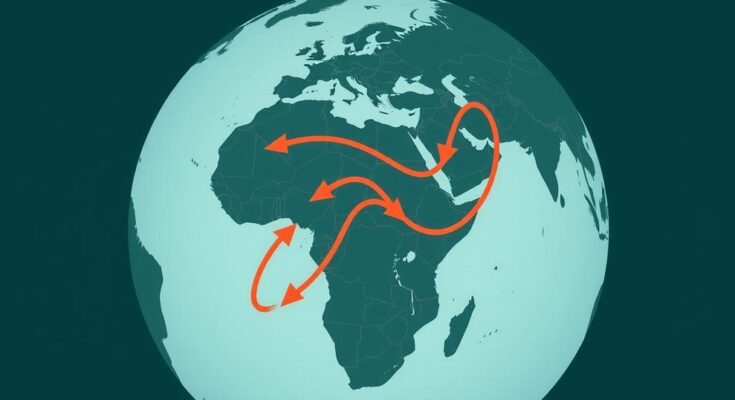Former President Donald Trump’s reinstatement of tariffs poses significant economic challenges for Kenya, impacting import costs and export competitiveness. The reliance on U.S. remittances highlights vulnerabilities if economic instability occurs. To address these issues, Kenya must seek alternative trade partnerships, strengthen domestic policies, and pursue favorable agreements, especially under AGOA, to enhance resilience amidst global economic changes.
The recent reinstatement of tariffs by former President Donald Trump has global implications that extend beyond traditional targets such as China, Mexico, and Canada, significantly affecting Africa and specifically Kenya. These policy changes are anticipated to raise import costs, disrupt crucial revenue streams, and compel Kenya to reassess its economic strategies amidst mounting challenges in the global trade landscape.
Kenya’s economy is heavily reliant on international trade, thus any perturbation could have profound repercussions. Trump’s latest directive imposing reciprocal tariffs on nations employing a Value Added Tax (VAT) system threatens Kenya, which maintains a 16% VAT on imports. This policy may also result in the U.S. levying tariffs on Kenyan exports, diminishing their competitiveness and impacting revenues from a key trading partner.
Moreover, retaliatory tariffs from China on American agricultural products, while seemingly disconnected, could lead to inflation in U.S. markets, adversely affecting Kenyan remittances. These remittances, vital to supporting numerous Kenyan households, amounted to over Ksh30 billion from the United States in January 2025 alone. If inflation and economic instability ensue due to Trump’s policies, Kenyans abroad may struggle to send financial support home, weakening the Kenyan shilling and escalating living costs.
In light of these uncertainties, Kenya must abandon a passive stance and proactively pursue alternative economic strategies. This involves forging stronger economic ties with China, Middle Eastern nations, and regional blocs such as the East African Community (EAC) and African Continental Free Trade Area (AfCFTA). These partnerships would ensure diverse markets for Kenyan exports and diminish reliance on the U.S.
Furthermore, the engagement with Gulf countries, particularly the UAE and Saudi Arabia, presents significant opportunities for trade and investment across sectors such as energy, infrastructure, and agriculture. Kenya’s domestic policies must also evolve to enhance resilience against external economic shocks, emphasizing local manufacturing and diversification in export products.
Additionally, Kenya ought to seek favorable trade agreements with the United States under the Africa Growth and Opportunity Act (AGOA) to mitigate potential tariff impacts on its exports, including textiles, coffee, and tea. A proactive diplomatic approach would be essential to negotiate favorable terms and secure exemptions.
The resurgence of Trump-era tariffs signifies a larger global economic shift that will directly and indirectly challenge Kenya’s economic stability. The threats to Kenyan exports, remittances, and rising import costs necessitate a robust response. By strengthening trade alliances, diversifying partnerships, and implementing resilient domestic policies, Kenya can better prepare itself for the forthcoming economic turbulence heralded by heightened tariffs and a retreat from globalization.
In conclusion, the renewed tariffs under Trump’s administration pose significant challenges to Kenya’s economy, influencing export competitiveness and diaspora remittances. To counter these threats, Kenya must proactively seek alternative trade partnerships, strengthen domestic policies, and negotiate favorable agreements. By enhancing economic resilience through diversified strategies and regional collaborations, Kenya can mitigate the adverse effects of these global economic shifts and prepare for future uncertainties.
Original Source: www.capitalfm.co.ke




